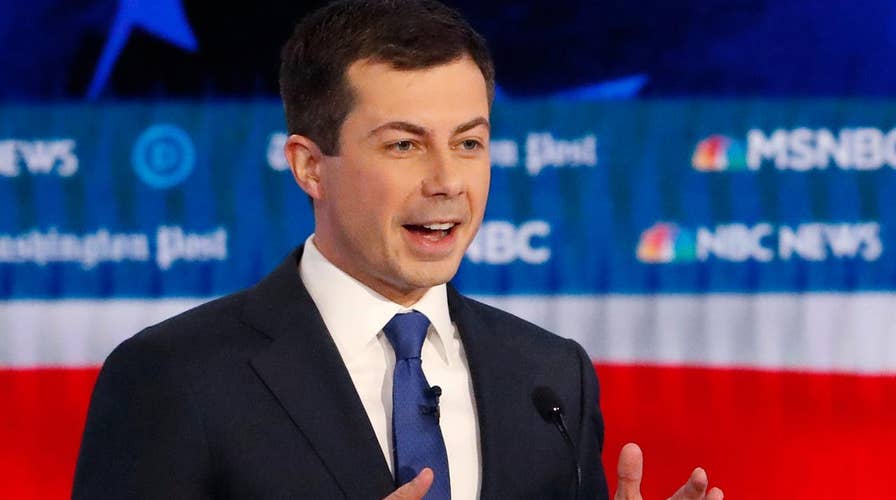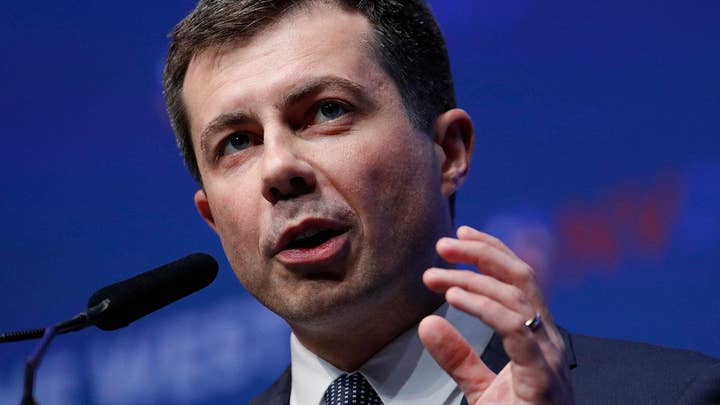Buttigieg receives frontrunner treatment at 5th Democratic debate
Political analyst Ron Meyer and liberal analyst Cathy Areu react to the fifth Democratic debate.
Presidential candidate Pete Buttigieg on Monday rolled out a plan to “promote dignity and security in retirement” through additional regular payments to older Americans, along with imposing a payroll tax on the wealthiest Americans to “protect Social Security forever.”
The South Bend, Ind., mayor said his father had been admitted to a hospital last winter for an undisclosed illness, and died this past January. He said a social worker told him the best option for long-term care would be to deplete their assets in order to qualify for Medicaid.
The Democrat said he asked himself, “Is that how this works in America?”
On Monday, his campaign announced plans to establish Long-Term Care America, a program providing people 65 and older with a benefit of $90 per day. “Over 11 million will receive benefits from the program throughout their lifetime,” according to the proposal.
Buttigieg, a self-described progressive who has resisted calls from the far left to embrace “Medicare-for-all,” also vowed to preserve Medicare Advantage – a private health care plan – for those favoring it.
“There’s no dignity in retirement without being able to choose the health care plan that’s right for you,” Buttigieg said.
The candidate said he would “revitalize the private long-term care insurance market” by bolstering support for caregivers — which would involve raising the minimum wage to a $15 an hour, expanding training programs, ensuring the possibility for career advancement and allowing home-care workers to unionize.
Many Americans have acted as at-home caregivers for their loved ones at their own expense. Buttigieg aimed to reduce that burden by providing “12 weeks of paid family leave, providing credit toward Social Security for family and other unpaid caregivers, and improving support by funding and training long-term care navigators and creating community-based service hubs,” according to the plan. Under the proposal, Buttigieg will require the Social Security administration to recognize at-home, unpaid caregiving as work, thus providing a credit toward benefits.
COUNCILMAN FROM BUTTIGIEG'S HOMETOWN ENDORSES BIDEN
In addition, Buttigieg aimed to secure the solvency of Social Security by imposing a payroll tax on individuals earning above $250,000 a year. He also vowed to “protect Social Security forever” by working with Congress to periodically increase taxes on the nation’s top earners, adding that benefits would increase over time to ensure seniors don’t fall beneath the poverty line.
Buttigieg also called for a public-option 401 (k) “with low fees and smart investment options so that all workers have the opportunity to supplement their Social Security benefits if they choose with employer contributions,” adding that it will “expand retirement savings among the 62 million workers locked out of tax-preferred retirement savings, and enable the typical worker to retire with over $500,000.”
Buttigieg said he’s “determined to usher in a new era for older Americans that upholds the unshakable promise that every American should be able to maintain a decent standard of living when they retire.”
Older adults are projected to outnumber children for the first time in United States history by 2035, according to a 2018 report by the U.S. Census Bureau. In addition, the nonpartisan, nonprofit Committee for a Responsible Federal Budget has predicted Social Security will become insolvent by 2035.
Buttigieg’s plan mirrored legislation put forth by other Democrats vying for the presidential nomination.
Sen. Bernie Sanders, I-Vt., introduced the Social Security Expansion Act in February with support from Sens. Kamala Harris, D-Calif., and Cory Booker, D-N.J.
Their proposal, however, aimed higher, pledging to extend the solvency of Social Security through 2071 by also lifting the earnings cap, subjecting those raking in over $250,000 a year to the Social Security payroll tax.
A chief economist at Moody’s Analytics reviewed Buttigieg’s proposal. Dr. Mark Zandi said the plan would secure the solvency of Social Security through 2051, adding that it will reduce the federal deficit by $1.2 trillion over 10 years.
“The reforms you have proposed will put the Social Security system on sounder financial ground, extending its solvency by more than 30 years into the middle of this century,” Zandi wrote to the presidential candidate. “More reforms will eventually be needed, but your reforms address the system’s financial problem, which will be a relief to a financially precious low and middle-income Americans.”
President Trump has not issued a plan to specifically address the impending insolvent system but said during the 2016 campaign that a thriving economy will secure Social Security by boosting the money paid into it.
CLICK HERE TO GET THE FOX NEWS APP
“The key to preserving Social Security and other programs that benefit AARP members is to have an economy that is robust and growing,” Trump said in a statement to the AARP in June 2016. “For too long Americans have had a great deal of uncertainty in their lives, and the reforms I will bring to D.C. will remove that uncertainty and will restore confidence in the American economy.”
Trump has fulfilled his promise of providing a tax cut, signing the Tax Cuts and Jobs Act in 2017, which Democrats have criticized for benefiting corporations and the richest Americans at the expense of the rest of the country.







